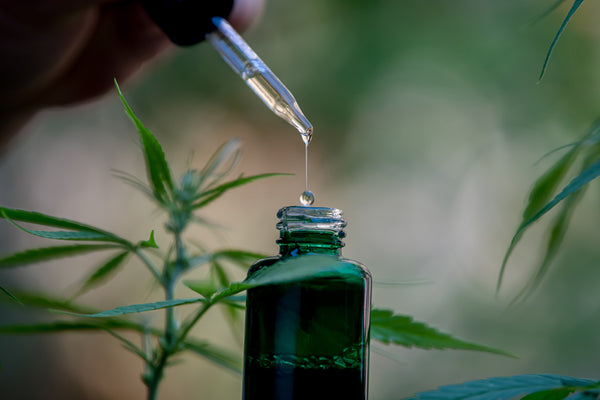Why Some CBD Companies Might Face Legal Issues

Uh-oh, a few CBD companies have gotten into trouble.
In December of 2020, the Federal Trade Commission (FTC) sent warning letters to a handful of CBD companies (1). Why? These companies made claims that their CBD products could treat serious conditions like cancer, high blood pressure, heart disease, and more.
While CBD is an awesome cannabinoid, and it does host a lot of great benefits, it is not FDA-approved. This basically just means that when someone sells a CBD product, they cannot claim that it will cure or treat any diseases. It may potentially help ease symptoms, and there has been a lot of very promising research done on CBD and its effect on various diseases, but not enough studies have been done to state anything conclusively.
So what exactly happened to cause the FDA to consider taking legal action? Keep reading to learn all about what’s going on with those CBD companies and to learn more about what CBD can do.
What happened?
The FDA has increased its scrutiny of CBD companies. The administration has sent out various warning letters in the past, urging those companies to stop using misleading marketing (2). A handful of the companies have not made the changes necessary, and the FDA is considering legal action. Over the past few years there have been a few different legal cases opened against specific CBD companies thanks to their claims.
Many companies claim that their products treat various medical conditions, and the FDA is starting to crackdown on those claims. It’s illegal to claim that a product can be used to treat or prevent a disease without having substantial proof (and years of extensive research) that those claims are accurate - therefore being considered FDA-approved.
At the moment one CBD drug is currently FDA-approved. Only that drug can make claims to treat medical issues.
All CBD companies must be honest about what benefits their CBD may potentially provide.
Quick refresher - How does CBD work?
CBD (short for cannabidiol) is a cannabinoid found in cannabis plants (usually hemp, but also marijuana). It is an all-natural compound that is known for its calming effects. Although CBD is similar to THC (the psychoactive component in cannabis) it is completely non-psychoactive. You do not have to worry about experiencing a “high” from CBD.
Cannabidiol is able to do some really cool things in your body by working with something called the endocannabinoid system (ECS). Everyone has an ECS. It’s responsible for things like regulating appetite, managing mood and stress levels, and much more (3). The system has two main receptors, CB1 and CB2. These receptors interact with cannabinoids like CBD to produce certain effects or benefits.

Wait, I thought CBD could treat certain conditions?
There’s a lot of talk about CBD and its benefits. Almost everywhere you look, there’s a news article, billboard, or Instagram post about CBD and how it can help you. CBD stores are popping up everywhere, and lots of people are talking about the effects of the popular cannabinoid. Does this mean that they’re all lying?
Is CBD a fraud?
Definitely not.
CBD is truly an awesome compound, and it does hold a wide variety of great benefits. However, those benefits have not been studied enough yet, so direct claims stating that CBD can cure illnesses or erase symptoms are not okay at this time.
To put it simply, companies can say things like “CBD may promote better sleep,” but it’s not okay to say “CBD will cure your insomnia.”
More human clinical trials need to be completed before we get a full picture of how CBD works, and what it can truly do in the human body. Lots of research has been done already, and most of it looks very promising! The majority of CBD research has shown that the compound has a whole lot of potential. This is all very exciting, which is exactly why there are so many CBD products on the market right now.
Studies have shown that CBD may potentially help with conditions like:
- Insomnia (4)
- Chronic pain (5)
- Migraines and headaches (6)
- Anxiety (4)
- Depression (7)
- Nausea (8)
- Skin issues (9)
- ...and many more
Plus, CBD has even been studied for its ability to clear up acne, ease symptoms of IBS, and manage appetite. There have even been studies on CBD’s effect on cancer growth! (10) However, that all needs to be taken with a grain of salt. Although a lot of research has been done on CBD’s effect on all of those conditions, far more research has to be completed before any definitive claims can be made.
It’s important to note that while CBD has shown a lot of promise in the studies that have been done, it isn’t a cure for anything. As of right now, there is only one medication containing CBD as the main ingredient that is FDA-approved. We’ll chat more about that later.
Plus, just like with any herb or supplement, CBD may work differently in each person. Where one person may find that the calming effects really help them to sleep better, another may notice more of an effect on their pain levels. The only way to really know how effective CBD will be for you is to give it a try!
What does this mean for me?
As a consumer, this news can only make things better for you. Because of the crackdown on CBD companies and the CBD products that they sell, dishonest companies will hopefully change their tune. CBD sellers are hopefully more likely to be honest about their products - both what their products are designed to do, and the ingredients list as well.
Hopefully this means that it’s not as likely that consumers will be misled by product descriptions that promise to cure diseases or directly treat ailments.
Although it’s good that the FDA is taking legal action, and it’s likely that more companies will be honest in the future, it’s still very important that you always do your research before buying CBD. You want to make sure you only purchase from a trusted seller. Plus, it’s good to have an accurate understanding of what CBD is and how it works in your body.

Choosing a Trusted CBD Company
Ultimately, you must still be diligent when purchasing a CBD product. You need to make sure that you’re only purchasing something that is high-quality, safe, and effective.
As we mentioned, there are definitely shady CBD sellers out there. Not only do some companies claim that their products can cure diseases, some actually sell bad products, too. CBD oil with poor ingredient quality, and less CBD than listed on the bottle (if they include any CBD at all!).
As one example, in the past, the FDA has found that some companies mislabel their products and claim their products contain more CBD than they actually have (11).
As long as you do your research and only purchase from a reputable company, you should be fine. A few things to look for when choosing a CBD product:
- Third-party testing: Only purchase CBD that has been tested by an independent third-party lab. This means that an unbiased lab, with no connection to the CBD industry, studied the product to see what the ingredients truly are. These reports also detect whether harmful chemicals are found in the product.
- Clearly labeled ingredients: Honest companies will list every ingredient in their product, including whether or not it includes THC, and what amount of THC it has. If THC is present, it must be labeled. CBD products must legally have less than 0.3 percent THC content in order to be sold in the United States. Although such a miniscule amount of THC is not likely to flag a drug test or cause any psychoactive effects, many people opt for CBD products that are THC-free. A CBD isolate product (like our Sublingual Tincture) contains zero THC.
- Positive reviews: Lastly, it’s always a good idea to check out the reviews to see what other consumers like and dislike about a particular product.
FDA-Approved CBD Products
As of January 2021, there are only a few FDA-approved products containing CBD or a synthetic cannabis derivative.
The FDA has approved Epidiolex, a cannabis-derived drug used to treat and manage symptoms of epilepsy. The FDA has also approved three synthetic cannabis-related drug products. These are Marinol (containing dronabinol), Syndros (containing dronabinol), and Cesamet (containing nabilone) (12). All three are designed to help manage nausea.
With all of the promising benefits shown in many studies already, it’s likely that there will be many more FDA-approved medications containing CBD available in the future. The CBD industry is hopeful that there will even be CBD products that get FDA-approval. But at this time, it’s important to note that there are only a few cannabis-derived drugs, and only one drug containing CBD, that have the FDA stamp of approval. Other CBD products are not designed to cure diseases, although they may potentially help alleviate symptoms of a disease.
In conclusion, whether you’ve been using CBD for years, or you’re interested in trying it out for the first time, make sure you are diligent when choosing a CBD company. Keep in mind that although CBD has been shown to have loads of health benefits, we need more studies to be done before we can make any claims.
Sources:
- https://www.fda.gov/news-events/press-announcements/fda-warns-companies-illegally-selling-cbd-products
- https://www.fda.gov/news-events/press-announcements/fda-warns-15-companies-illegally-selling-various-products-containing-cannabidiol-agency-details
- https://www.ncbi.nlm.nih.gov/pmc/articles/PMC5877694/
- https://www.ncbi.nlm.nih.gov/pmc/articles/PMC6326553/
- https://pubmed.ncbi.nlm.nih.gov/31980957/
- https://www.ncbi.nlm.nih.gov/pmc/articles/PMC7348860/
- https://pubmed.ncbi.nlm.nih.gov/24923339/
- https://www.ncbi.nlm.nih.gov/pmc/articles/PMC3165951/
- https://www.ncbi.nlm.nih.gov/pmc/articles/PMC4151231/
- https://www.ncbi.nlm.nih.gov/pmc/articles/PMC6387667/
- https://www.fda.gov/news-events/public-health-focus/warning-letters-and-test-results-cannabidiol-related-products
- https://www.fda.gov/news-events/public-health-focus/fda-and-cannabis-research-and-drug-approval-process




